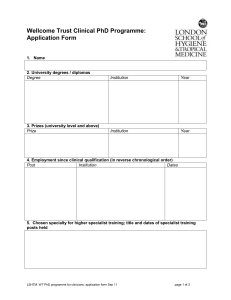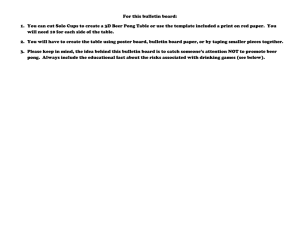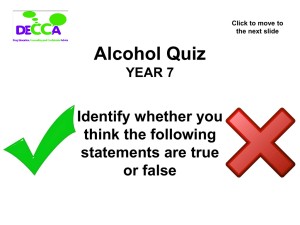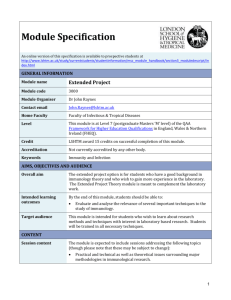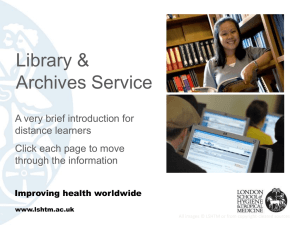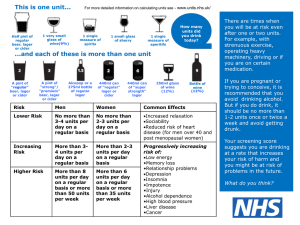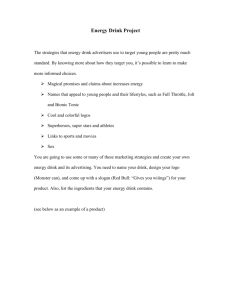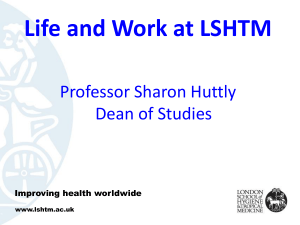Powerpoint Template: White
advertisement
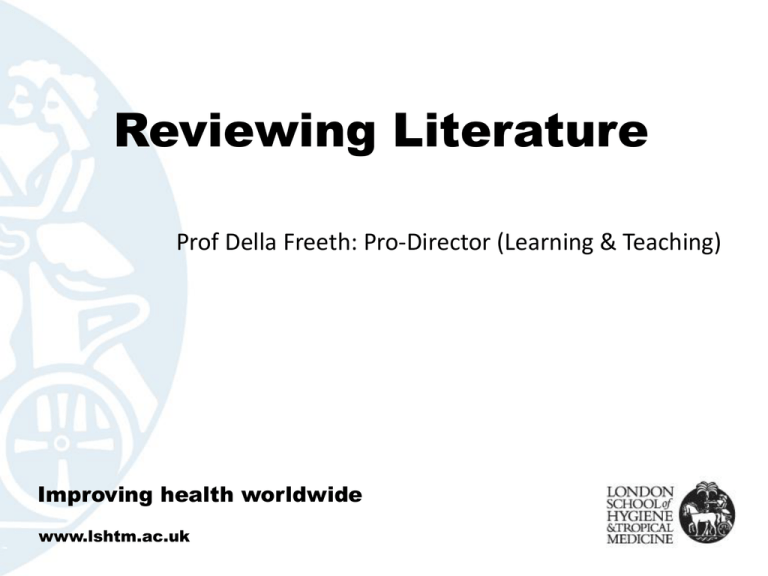
Reviewing Literature Prof Della Freeth: Pro-Director (Learning & Teaching) Improving health worldwide www.lshtm.ac.uk Why search for and review literature? • To know what has already been done or is already known • To give you ideas • To learn how to do certain things • To focus your reading and your research study • To identify ‘your’ gap in the literature • To examine you work in relation to others’ work The role of the literature review chapter in the thesis • (normally Chapter 2) • To identify the gap in knowledge your thesis addresses – Thus, it ends with your research question(s) • Some styles of literature review • Systematic Review – e.g. The Cochrane Library www.thecochranelibrary.com/view/0/AboutCochraneSystematicRev iews.html • Realist Synthesis – Popular in policy work & improvement science e.g. www.implementationscience.com/content/7/1/33 • Best-evidence review – e.g. ‘Best evidence medical education’ (BEME) www.ncbi.nlm.nih.gov/pubmed/20095769 • Narrative review – traditional, lots of sources, e.g. www.ncbi.nlm.nih.gov/pmc/articles/PMC2647067/ When? • First thing you start …. • … last thing you finish. How? • Sufficiently systematically for the task at hand • As efficiently as you can … learn to get more efficient • Be prepared to present and defend your search strategy • Update periodically and definitely at the end. Keep excellent records: it saves time in the end • Learn to use bibliographic referencing software: it saves time in the end. • Keep all the details you may need about every source you read every time: it saves time in the end. – Note female authors, so you don’t write about them as ‘he’ • Keep brief notes on the key points you think you will use from a source: it saves time in the end • Briefly note why you think you will not make use of some things you read: it saves time in the end What to do with what you have found • Read-Think-Write [repeat] More advice! • Try to read one research paper or one book chapter every working day throughout your degree • Don't forget to search & read between thesis submission & your viva Finding and using information: how can your librarian help? Jane Falconer User Support Services Librarian Library & Archives Service www.lshtm.ac.uk/library Impact of increased complexity on comprehensiveness of results 1 alcohol consumption 22,766 2 alcohol consum* 23,355 3 alcohol consum* OR alcohol intake OR beer consum* or beer intake or binge drink* 30,950 4 ((alcohol* OR beer OR wine OR lager OR spirit* OR drink) ADJ3 (consum* OR unit* OR purchas* OR use* OR intake OR binge)) OR drink* rate* OR drunk* 57,702 5 ((alcohol* OR beer OR wine OR lager OR spirit* OR drink) ADJ3 (consum* OR unit* OR purchas* OR use* OR intake OR binge)) OR drink* rate* OR drunk* OR exp alcohol drinking/ 80,221 Numbers correspond to number of results retrieved from Ovid MEDLINE® 1946 to May week 3 2012. 1. ((alcohol* or beer or wine or lager or spirit* or drink) adj3 (consum* or unit* or purchas* or use* or intake or binge)) or drink* rate* or drunk* 74863 2. exp Alcohol Drinking/ 56871 3. 1 or 2 101264 4. media or film* or motion picture* or movie* or radio or television* or telly or tv or video or journalis* 572246 5. exp Mass Media/ 6. 4 or 5 7. adolescen* or pubescen* or juvenil* or underage* or teen or teens or teenage* or youth or youths 1814916 8. Adolescent/ 1730862 9. Adolescent Behavior/ 10. 7 or 8 or 9 11. great britain or united kingdom or gb or uk or scotland or england or ireland or wales 408536 12. exp Great Britain/ 329492 13. 11 or 12 422499 14 3 and 6 and 10 and 13 41368 579811 23347 1814916 56 Researcher Development Framework D2 - Publication A1 - Information seeking Information literacy and management C1 - Legal requirements IPR and copyright C2 - Research strategy Project planning & delivery http://www.vitae.ac.uk/researchers/428241/ Researcher-Development-Framework.html Data Management Goals Data management can help you to achieve your research goals I wish to: find data quickly by labelling & organising my files I wish to: avoid giving out personal information by keeping it in a secure area that only I can access I wish to: avoid data loss by creating backups at regular intervals I wish to: Ensure my data can be understood by colleagues by documenting the context in which it was created and the meaning of each variable http://www.lshtm.ac.uk/research/researchdataman/ ResearchDataManagement@lshtm.ac.uk Open access publishing Copyright Training available from Library staff Literature searching Research data management Making your thesis legal and depositing it online Creative commons licensing and open access publishing Plus one-to-one tuition at a time to suit you, face to face or via Skype All available via the Transferrable Skills Programme Contact the Library & Archives • library@lshtm.ac.uk • @LSHTMlibrary • @LSHTMarchives • http://blogs.lshtm.ac.uk/library/ • 020 7927 2276 Or come up to Keppel St and talk to us www.lshtm.ac.uk/library/
